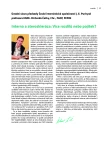-
Medical journals
- Career
Non-pharmacological treatment – results from Poděbrady
Authors: Lukáš Zlatohlávek 1; Michal Vrablík 1; Zuzana Urbanová 2; Hana Pejšová 1; Jaroslav Hubáček 3; Richard; Češka 1
Authors‘ workplace: III. interní klinika 1. LF UK a VFN Praha, přednosta prof. MUDr. Štěpán Svačina, DrSc., MBA 1; Klinika dětského a dorostového lékařství 1. LF UK a VFN Praha, přednosta prof. MUDr. Jiří Zeman, DrSc. 2; Laboratoř molekulární genetiky IKEM Praha, přednosta MUDr. Jan Piťha, CSc. 3
Published in: Vnitř Lék 2014; 60(11): 958-962
Category: Reviews
Overview
Objectives:
The study was aimed to determine risk factors of atherosclerosis after one month lifestyle intervention in overweight/obese children and also FTO and MC4R gene variants associated with obesity.Design and Methods:
350 non-diabetic Czech children (age 13.7 ± 2.1 years, 163 ± 10.6 cm hight) was examined. Before and after 4 weeks of lifestyle intervention (comprising a reduction of energy intake), biochemical and anthropometrical measurements were performed.Results:
The mean weight loss achieved was 6.2 ± 2.1 kg (P < 0.001). Significant associations between BMI decrease and FTO and MC4R variants were found. Carriers of the FTO GG genotype and/or MC4R CC genotype lost significantly more body weight in comparison to the non-carriers (P < 0.0009 for BMI and P < 0.002 for body weight). The differences remain significant after adjustment for sex age and baseline values (P = 0.004 for BMI and P = 0.01 for body weight).Conclusions:
It is necessary to look for the risk individuals with wrong response to the regime intervention. This individuals is necessary early treat with drugs to prevention clinically complications.Key words:
childhood obesity – components of metabolic syndrome – predisposition – response to intervention
Sources
1. Zlatohlávek L, Urbanová Z, Vrablík M et al. Sledování faktorů aterokslerózy u obézních dětí. Čes-Slov Pediat 2011; 66(3): 153–156.
2. Šamánek M, Urbanová Z Výskyt nadváhy a obezity u 7 427 českých dětí vyšetřených v roce 2006. Čes-Slov Pediat 2008; 63(3): 120–126.
3. Hubacek JA, Pikhart H, Peasey A et al. FTO variant, energy intake, physical activity and basal metabolic rate in Caucasians. The HAPIEE study. Physiol Res 2011; 60(1): 175–183.
4. Haupt A Impact of variation near MC4R on whole-body fat distribution, liver fat, and weight loss. Obesity (Silver Spring) 2009; 17(10): 1942–1945.
5. Loos RJ, Lindgren CM, Li S et al. Common variants near MC4R are associated with fat mass, weight and risk of obesity. Nat Genet 2008; 40(6): 768–765.
6. Hubacek JA, Pitha J, Adamkova V et al. A common variant in the FTO gene is associated with body mass index in males and postmenopausal females but not in premenopausal females. Czech post-MONICA and 3PMFs studies. Clin Chem Lab Med 2009; 47(4): 387–390.
7. Dlouhá D, Suchánek P, Lánská V et al. Body mass index change in females after short-time life style intervention is not dependent on the FTO polymorphisms. Physiol Res 2011; 60(1): 199–202.
Labels
Diabetology Endocrinology Internal medicine
Article was published inInternal Medicine

2014 Issue 11-
All articles in this issue
- New SGLT2 inhibitor empagliflozin: modern and safe treatment of diabetes
- Prevention of cardiovascular diseases in clinical practice: is it possible to achieve improvement?
- Residual cardiovascular risk markers
- New aspects of hormone replacement therapy
- News in lipid lowering treatment
- Non-pharmacological treatment – results from Poděbrady
-
Familial hypercholesterolemia – past and present.
My experiences and findings in our group of patients with familial hypercholesterolemia - LDL-apheresis in the treatment familial hypercholesterolemia
- Extended options of anticoagulant treatment in thromboembolism
- What do have arterial and venous disease in common?
- Cardiovascular risk profile in 40-year old men and 50-year old women in the Czech Republic: results of a cross-sectional survey
-
Adherence of type 2 diabetes patients on insulin analogues application: missed dose, time imprecision and dose reduction
The results of GAPP2TM(Global Attitudes of Physicians and Patient) survey in the Czech Republic
- Internal Medicine
- Journal archive
- Current issue
- Online only
- About the journal
Most read in this issue- New aspects of hormone replacement therapy
- LDL-apheresis in the treatment familial hypercholesterolemia
- New SGLT2 inhibitor empagliflozin: modern and safe treatment of diabetes
- Extended options of anticoagulant treatment in thromboembolism
Login#ADS_BOTTOM_SCRIPTS#Forgotten passwordEnter the email address that you registered with. We will send you instructions on how to set a new password.
- Career

